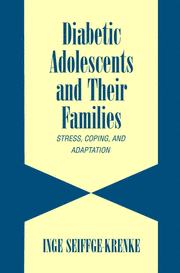Book contents
- Frontmatter
- Contents
- Foreword by Stuart T. Hauser
- Preface
- 1 Epidemiology of Chronic Illnesses in Adolescence
- 2 Coping with Illness in Adolescence: An Overview of Research from the Past 25 Years
- 3 Coping with Diabetes: A Longitudinal Study
- 4 Knowledge of the Illness, Compliance, and Patient–Physician Relationships
- 5 Self-Concept, Body Image, and Perceived Health
- 6 Adolescent, Parental, and Family Coping with Stressors
- 7 Chronic Illness and the Family: The Perspectives of Mothers, Fathers, and Siblings
- 8 Friendships, Romantic Relationships, School, and Career
- 9 Successful Adaptation or the Development of Psychopathology?
- 10 Pathways for Resolving the Dilemma between Developmental Progression and Adaptation to the Illness
- 11 Implications for Prevention and Intervention
- References
- Index
4 - Knowledge of the Illness, Compliance, and Patient–Physician Relationships
Published online by Cambridge University Press: 06 August 2009
- Frontmatter
- Contents
- Foreword by Stuart T. Hauser
- Preface
- 1 Epidemiology of Chronic Illnesses in Adolescence
- 2 Coping with Illness in Adolescence: An Overview of Research from the Past 25 Years
- 3 Coping with Diabetes: A Longitudinal Study
- 4 Knowledge of the Illness, Compliance, and Patient–Physician Relationships
- 5 Self-Concept, Body Image, and Perceived Health
- 6 Adolescent, Parental, and Family Coping with Stressors
- 7 Chronic Illness and the Family: The Perspectives of Mothers, Fathers, and Siblings
- 8 Friendships, Romantic Relationships, School, and Career
- 9 Successful Adaptation or the Development of Psychopathology?
- 10 Pathways for Resolving the Dilemma between Developmental Progression and Adaptation to the Illness
- 11 Implications for Prevention and Intervention
- References
- Index
Summary
As detailed in previous chapters, insulin-dependent diabetes mellitus displays several typical features of a chronic illness. Medical adaptation can be clearly ascertained through metabolic control, as determined by HbA1 and HbA1c values, and the quality of metabolic control is directly related to short- and long-term complications. The therapeutic demands on patients and their parents are complex and involve injecting insulin, monitoring glucose levels in the blood and urine, and attending to dietary regulations on a daily basis. Obviously, diabetes therapy can only be successful if both the adolescent and the parents understand the treatment. For the attending physician, the goals of diabetes therapy include reducing or eliminating clinical symptoms and helping the patient to achieve normal growth, correctly timed maturation, and physical efficiency. Certainly, the most important aim is to minimize the danger of long-term damage. Longterm optimization of metabolism can only be based on acceptance of the illness by the adolescents and on their readiness to act independently and responsibly. Accordingly, because adolescents must receive intensive and adequate medical treatment, the quality of the patient-physician relationship will also decisively influence their motivation to follow physicians' instructions.
This chapter examines the medical parameters and the course of diabetes, based on the results of the longitudinal study presented in chapter 3. The adolescents' acceptance of medical assistance will also be explored, as well as the effects of diabetes-related knowledge and attitudes on metabolic control.
- Type
- Chapter
- Information
- Diabetic Adolescents and their FamiliesStress, Coping, and Adaptation, pp. 42 - 62Publisher: Cambridge University PressPrint publication year: 2001



